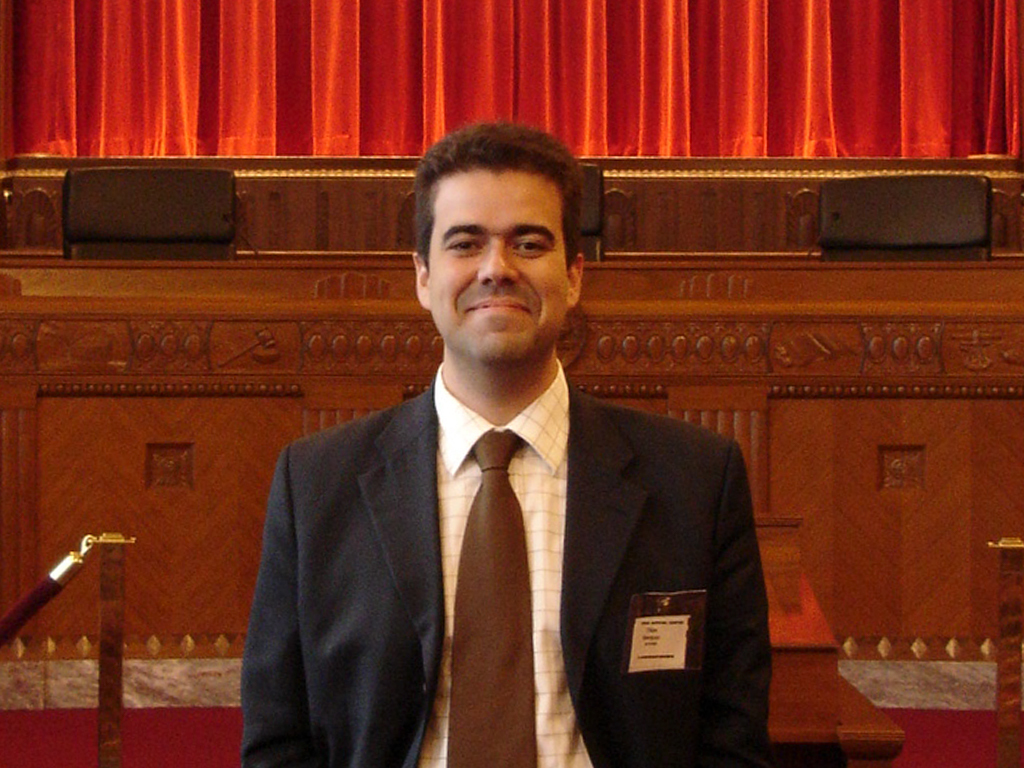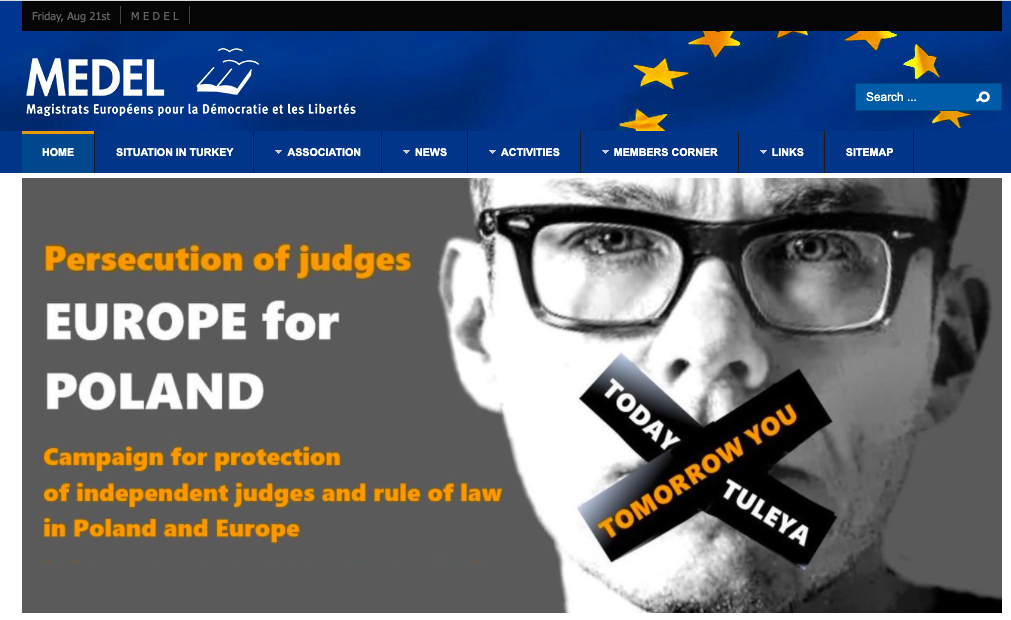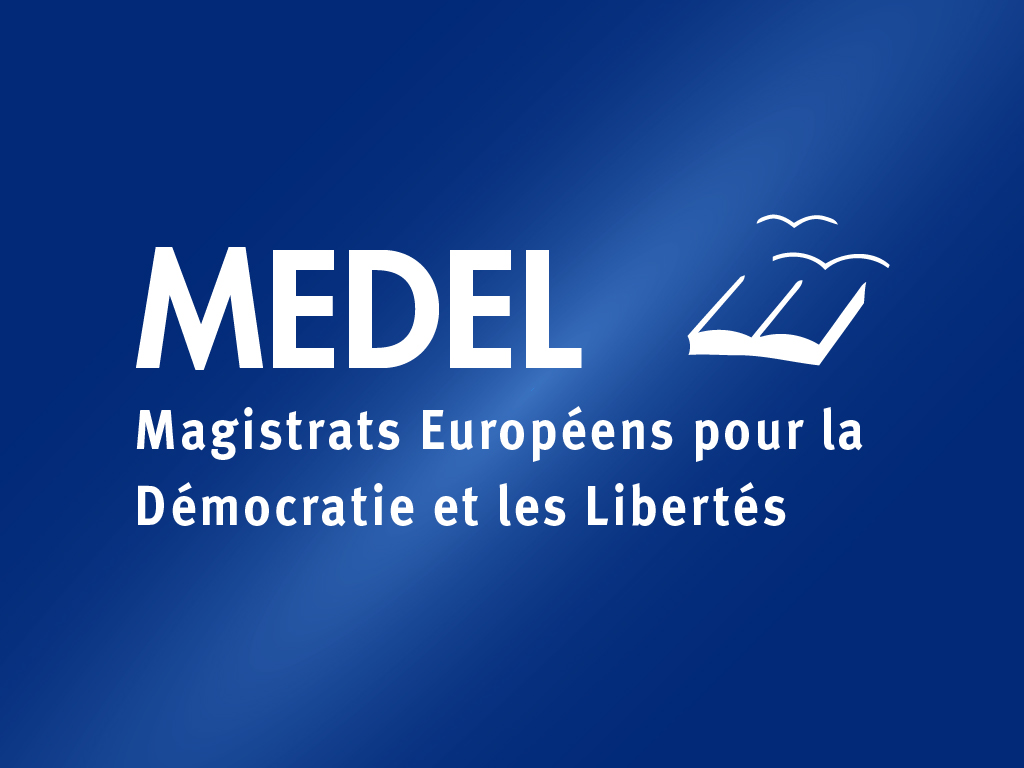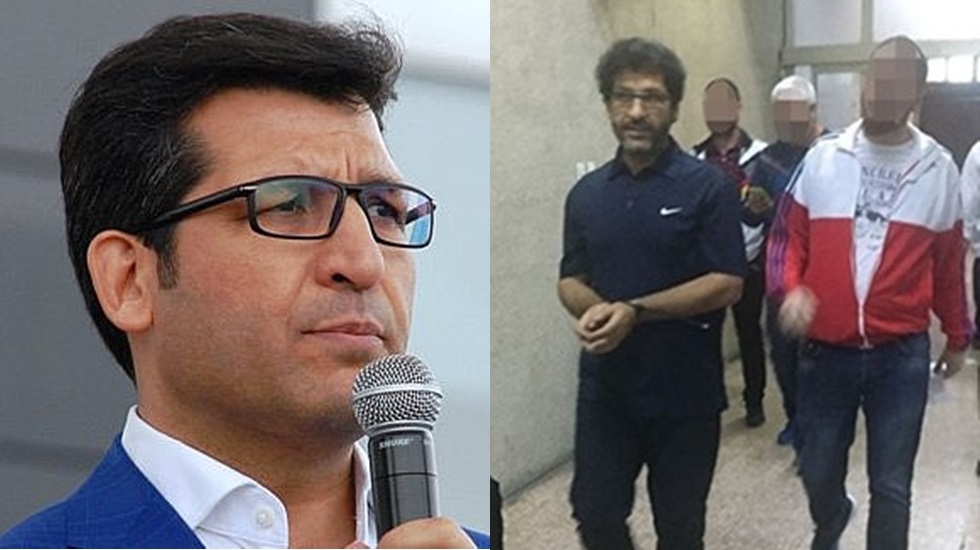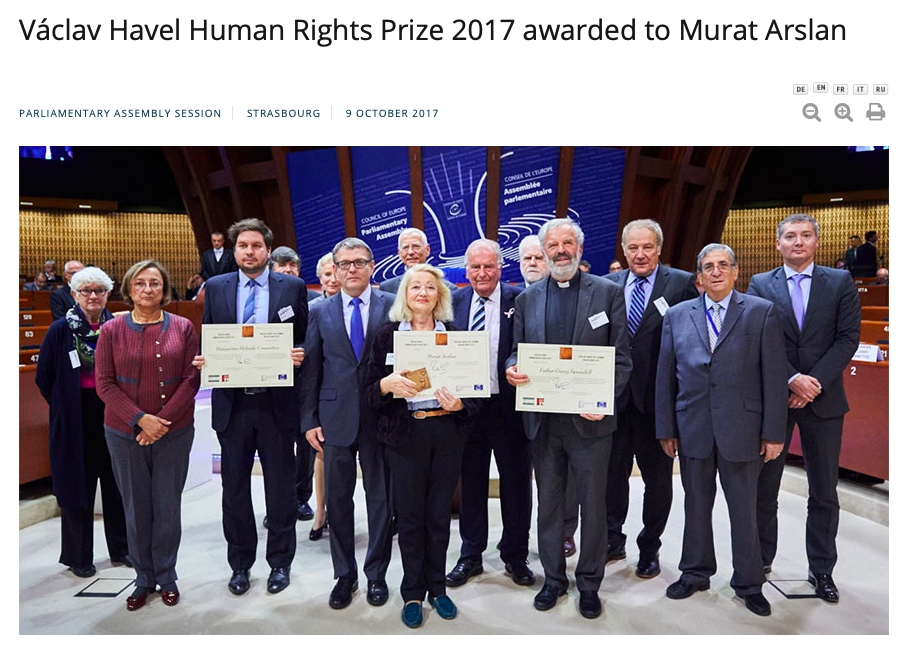Within the scope of our new project we are publishing interviews with prominent European lawyers, academics and executives of judges’ associations. Our fourth interview is with Filipe Marques who is the president of MEDEL – Magistrats Européens pour la Démocratie et les Libertés.
Q1: Mr. Marques, You are president of MEDEL which is an organization of judges and prosecutors. Could you tell us about MEDEL and its work?
Mr Marques: MEDEL – Magistrats Européens pour la Démocratie et les Libertés, is a European NGO that gathers associations of judges and prosecutors, acting as an “umbrella association”. It was founded in June 1985 in Strasbourg by eight professional organizations (trade unions or associations) of judges and prosecutors from six European countries (France, Belgium, Italy, Spain, Portugal and Germany) that had a progressist view of the judiciary and the role of magistrates in the administration of justice. This was a continuation of several previous meetings between European magistrates committed to defending the independence of the judiciary, the promotion of rule of law and the construction of a European judicial area based on the guarantee of fundamental rights, in political as well as economic and social matters.
After the fall of the Berlin Wall and the disappearance of the Iron Curtain, MEDEL was strongly committed to supporting the establishment of independent judicial institutions that respect the rule of law in the former Eastern Bloc countries. The association gradually expanded, welcoming new organizations of judges and prosecutors from Eastern and Southern Europe (Poland, Romania, Moldova, Czech Republic, Serbia, Bulgaria, Montenegro, Greece, Cyprus, Turkey).
At the
same time, the association’s activities have diversified. The organisation of meetings and colloquia was complemented by the adoption of public statements, as well as observation and support missions carried out in partnership with other organisations, in countries where the independence of Justice was undermined (Serbia in 2012, Turkey since 2015). In addition, MEDEL has gradually become a player in the legal and judicial debate in the European area. MEDEL has been a consultative NGO with the Council of Europe since 6 March 1995, having contributed to the adoption of texts such as the European Charter of Judges or the recommendations of the Council of Europe on justice, and the creation of new institutions such as the Consultative Council of European Judges (CCJE) and the Consultative Council of European Prosecutors (CCPE)..
MEDEL currently brings together 23 judges and prosecutors organisations, representing approximately 18,000 magistrates in 16 European countries.
Q2: As the executive of a very well-known and important NGO, you are dealing with wide-range of issues. The worrisome decline in terms of the independence of the judiciary in Europe is one of those (i.e: Poland, Hungary). What should we do to prevent this decline from spreading to other countries?
Mr Marques: It’s a sad reality that the problems related to the independence of the judiciary are the main issue nowadays – and not only in Europe. What a decade ago seemed to be isolated cases, became in recent times a very worrying trend.
Faced with this scenario, the role of civil society and NGO’s – especially those in the justice area – is to alert and give warning signs of threats coming from the executive or other sources that may lead to a gradual loss of independence of the judiciary.
Judges, Prosecutors and Lawyers are working on the ground every day and they have a precise notion of the importance of their role and the threats that may derive from any political decisions. It is of fundamental importance that these actors and their associations and organizations are a direct and objective source of information either to civil society as a whole (through independent media, e.g.) or to political institutions that may have a word to say in the protection of the independence of the judiciary (European Union, Council of Europe, UN specialized agencies).
The ongoing situation in Poland and the traumatic experiences in Turkey and Hungary have led to an increase of awareness among legal professionals and the need for coordinated action. The “March of the 1000 Robes” (held in January this year in Warsaw) was a remarkable and never before seen sign of unity of the European legal professions in solidarity with the Polish colleagues, followed by another impressive online event on June 8th – “Europe for Poland”, co-organized by Iustitia, European Association of Judges (EAJ), MEDEL, Norwegian Helsinki Committee, Amnesty International Norway, Human Rights House Foundation, Norwegian Judges Association and Rafto Foundation for Human Rights.
In their 2005 book “Les juges dans la mondialisation – La nouvelle révolution du droit” (Paris: Éditions du Seuil et La République des Idées, p. 84) Julie Allard and Antoine Garapon said that “the work of Judges carries a universal dimension of its own. That is why it is possible to state that Judges – therein lying their specificity – are the most universalizable, but also the most universalizing, of the three powers described by Montesquieu”. What we are witnessing now is that, regardless of their nationality, judges and prosecutors are getting together to defend the universal common base of their function – their independence.
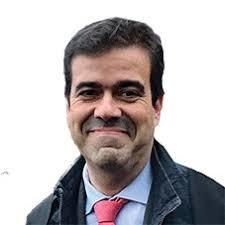 It’s up to the entire society to defend the fundamental value of the independence of the judiciary, and in order to mobilize it, all of the legal professions must fight to increase awareness of both the importance of it and the threats currently in place. If we manage to do it, we will be in a much better position to stop the spreading of the decline of the independence of the judiciary.
It’s up to the entire society to defend the fundamental value of the independence of the judiciary, and in order to mobilize it, all of the legal professions must fight to increase awareness of both the importance of it and the threats currently in place. If we manage to do it, we will be in a much better position to stop the spreading of the decline of the independence of the judiciary.
Q3: Rule of law is one of the values the European Union is founded on. An independent and impartial tribunal is guaranteed by Art. 6 ECHR which all members of Council of Europe are party to. However, legal texts cannot ensure this principle is observed. Support and vigilance of fellow citizens are essential. How can we better explain that the independence of the judiciary and lawyers exists to ensure the right to a fair trial of individuals to fellow citizens and secure their support?
The independence of the judiciary is one of the cornerstones of any democratic and free society – only with independent and strong judiciaries may citizens be sure that they can exercise fully their citizenship without fear of having their rights infringed or suppressed by any authority (political, economic or any other de facto power). That is precisely the reason why all the moves that in many countries have been recently taken by populist governments have immediately targeted the judiciary and its institutions.
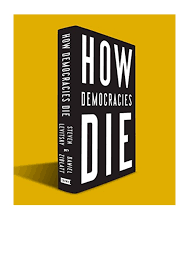 Steven Levitsky and Daniel Ziblatt describe in their book “How Democracies Die” (New York: Crown Publishing Group, January 2018), how the democratic system is being captured and subverted from the inside by autocrats, and one of the first steps they highlight is precisely “packing and “weaponizing” the courts and other neutral agencies”, saying that “the tragic paradox of the electoral route to authoritarianism is that democracy’s assassins use the very institutions of democracy – gradually, subtly, and even legally – to kill it.”.
Steven Levitsky and Daniel Ziblatt describe in their book “How Democracies Die” (New York: Crown Publishing Group, January 2018), how the democratic system is being captured and subverted from the inside by autocrats, and one of the first steps they highlight is precisely “packing and “weaponizing” the courts and other neutral agencies”, saying that “the tragic paradox of the electoral route to authoritarianism is that democracy’s assassins use the very institutions of democracy – gradually, subtly, and even legally – to kill it.”.
As I already said, it is essential that the organizations of judges, prosecutors and lawyers use their direct knowledge from the ground to provide accurate information on what is the reality of the judiciary, thus preventing campaigns of disinformation. But we also need these legal professionals to start actively debating and intervening in the public arena. Legal professionals – and especially magistrates – are always very reluctant to have an active voice in any public debate. However, the duty of reserve that is inherent to the profession should not – must not – prevent judges and prosecutors to speak out in defence of the Rule of Law when it is being put at risk. As MEDEL has analysed in a conference organized in Sofia, Bulgaria, in November 2018, in certain cases of direct attacks against the independence of the Judiciary, there is even the duty of speaking publicly. To do it, we must overcome the usual problem of communication between legal professions and common citizens – it is our task to try to communicate with society in a plain, non-hermetical language which – we must admit – has often proven to be very difficult.
Q4: In your article published in April, on the recent development in Poland and Hungary, you said “the reaction of EU institutions was timid and ineffective, blocked by short-term political tactics and strict unanimity rules.” You also said “Europe is based on common constitutional traditions and common values. In order to protect it, we need a truly independent judiciary in which citizens can see their right upheld. Without the rule of law, we cannot say that Europe is truly free.” Considering that Amsterdam Regional Court concluded that Poland judiciary as a whole is not independent and impartial, can the inaction of the Council and the Commission threaten the integrity of European Judicial system?
Mr Marques: Let us be clear: the integrity of the European Judicial Area is not being put at risk by the European Institutions – it’s governments like the ones currently in power in Poland or Hungary who are doing it. Had those governments not taken measures totally against the basic principles of the Rule of Law that are in the foundations of the EU and we would not be facing most of the problems we do now.
That being said, it is true that the initial reaction of European institutions was timid, mainly in what regards Hungary. The deterioration of the independence of the judiciary in Hungary was well known, and already in 2013 the European Parliament, in the report made by MEP Rui Tavares (2012/2130(INI)), clearly identified various threats to the independence of the judiciary and recommended the European Commission to take action in that field. Unfortunately, at that time, we did not see a strong and decisive reaction from the EU Commission and that may have opened the door to the events that we have been seeing recently in Poland. If the reaction had been stronger with Hungary, maybe the situation in Poland could have gone differently.
After that, however, the EU institutions have stepped up in their reaction. The article 7 and infringement procedures initiated by the European Commission against Poland and Hungary are a very positive move and the Commission is now performing its duty of guardian of the Treaties.
Another important EU institution that has started playing a decisive role is the European Court of Justice. After the ground-breaking decision of February 2018 (“Associação Sindical dos Juízes Portugueses” – and let me here stress once again the decisive role of judicial associations, as it was one – a member of MEDEL – that brought this case to the ECJ), it is clear that the independence of national judicial systems is not exclusively a political matter, but also (and mainly) a juridical one. As you said, Europe is built on common principles and one of the basic ones is the respect for the Rule of Law. Any action from national governments must always comply with these principles and a breach of them puts at risk the entire European Union and not only the national member State concerned. Therefore, it is not only at the level of Commission or Council that the situation must be dealt with, but also before the ECJ, which will increasingly have a word to say in the protection of the independence of the Judiciary in Europe.
In conclusion, MEDEL believes that after a timid initial reaction, the European institutions have now clearly realized that their role in the protection of the Rule of Law and the independence of the Judiciary is crucial, because it is the only way to ensure the integrity of the European Judicial system.
Q5: Our last questions are about the Council of Europe / The European Court of Human Rights and Turkey. We have enjoyed the incredible solidarity offered by MEDEL, which has shown great interest in the problems of arrested judges, prosecutors and lawyers in Turkey. You have great insight into the human rights situation in Turkey, especially relating to the legal profession as a whole, what would you like to say to our European colleagues as to how they could help their Turkish colleagues?
The situation in Turkey is probably the most dramatic MEDEL had to face in its history. Our member association, YARSAV, was administratively disbanded immediately after the attempted Coup d’État of July 2016 and many of its members were arrested, dismissed and deprived of freedom or property without any solid evidences, basic guarantees or procedural rights. Murat Arslan, the President of YARSAV, is in jail since October 2016 and was sentenced on January 18th, 2019 to 10 years imprisonment, after a trial that didn’t meet any basic principles of a due process of law. MEDEL does not recognize the legitimacy of the dismantlement of YARSAV and still considers it a full member and its board members as its rightful representatives.
The human rights situation in Turkey is appalling: a judiciary under control of the executive (as the ENCJ decision of suspending the Turkish High Judicial Council shows), prisoners in solitary confinement for years without basic rights, mass dismissals and arrests with absolutely no guarantees.
It is the duty of all of us who care about the independence of the Judiciary to keep denouncing the situation in all possible ways. There are brave people fighting inside and outside Turkey to overcome this tragic situation and that keep hoping for the day when the Turkish judiciary will again be free and independent. We must provide them with all our solidarity and support, giving them voice and making them heard in international institutions such as the UN, the Council of Europe or the European Union.
By appointment of MEDEL and others, Murat Arslan was awarded in2017 the Václav Havel Human Rights Prize, by the Parliamentary Assembly of the Council of Europe. Initiatives like these give confidence to those courageously fighting for the independence of the judiciary in Turkey and increase the visibility of their struggle. As Murat Arslan said in his acceptance speech: “The price that we are paying just raises our faith in the coming days that the rule of law and democracy will be internalized and raises our fighting spirit.”.
Q6: In your recent joint letter to SG of Council of Europe, you say “Four years later and the situation has gone even worse.” and you mention the situation of imprisoned judge Husametin Ugur who has been subject to ill-treatment in prison. According to reliable reports more than hundred judges have been in solitary confinement for four years. However, ECtHR found inadmissible the request made under Rule 39 of the Convention? What would you say about this?
Mr Marques: Since the beginning of the situation in Turkey, MEDEL and other institutions have addressed the European Court of Human Rights, asking for interim measures, as it was clearly evident for us that the lack of independence of the Judiciary in Turkey meant that there was an emergency situation and that there was no possibility of previous domestic remedy. The ECHR, however, has systematically refused to adopt interim measures.
The evolution of the situation has shown, unfortunately, that MEDEL and the other institutions that asked for interim measures were right. The reports recently published by the Council of Europe’s Committee for the Prevention of Torture and Inhuman or Degrading Treatment or Punishment are an impressive picture of the reality of treatment and conditions of detention in Turkey.
Four years later, we are still waiting for decisions from the ECHR. I think the ECHR must face this issue seriously and look at it as a matter of its own credibility – the reputation it has built during the years, of the main guardian of human rights in Europe, will be jeopardized if its decisions keep being ineffective because of the excessive length of procedures. The criteria for issuing interim measures must be reviewed in order to face emergencies that cannot wait for a lengthy procedure. The protection of basic human rights cannot wait.
Q7: In the cases of Alparslan Altan and Hakan Bas the ECtHR deciced that detention of judges without respecting procedural steps laid in the Law on Judges and Prosecutors infringes the principle of judicial independence. However, the TCC in its recent judgment refused to comply with these decisions. In your opinion, should the ECtHR cease to consider the TCC as a source of effective remedy?
Mr Marques: As I said earlier, since the beginning that MEDEL has been saying it – there is no domestic remedy available in Turkey. If you don’t have an independent Judiciary, it is impossible to have an effective domestic remedy. Therefore, the decision of the Turkish Court does not come as a surprise for us.
So, yes, the ECHR should cease to consider the TCC as a source of effective remedy – it should have done so four years ago.
Q8: December, 2019, the European Council adopted a human rights sanction regime. Can it produce accountability, to some extent, for those responsible for gross human rights violations, and help to improve the situation in Turkey?
Mr Marques: In December 2019, the European Council agreed that the European External Action service should start with the preparatory work towards legislation for a global sanctions regime to address serious human rights violations, equivalent to the so-called “Magnitsky Act” of the United States, but the sanction regime is yet to be introduced.
Any initiative intended to protect human rights and punish those responsible for their violation is obviously welcome. As I said, the situation in Turkey is a clear and objective mass violation of human rights, so in theory there is always the possibility of the future sanction regime being used to make accountable those responsible.
Let me stress, however, that more than seeking punishment for those who destroyed it, we need to fight for the return of the Rule of Law and the independence of the judiciary to Turkey as soon as possible. It’s the only way to protect the Turkish citizens and ensure that their basic fundamental right of access to an independent justice system is guaranteed.
Source: The Arrested Lawyers Initiative


